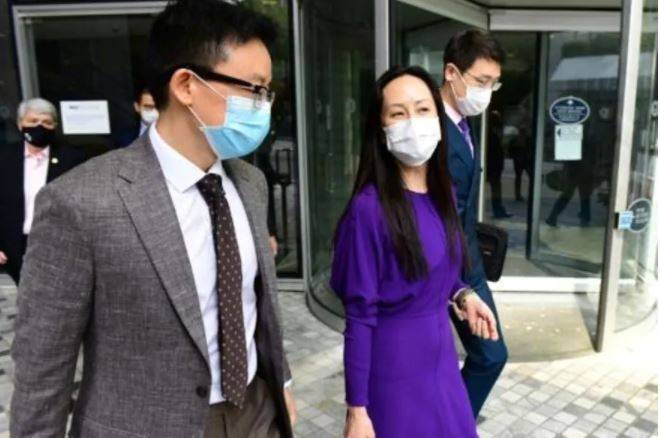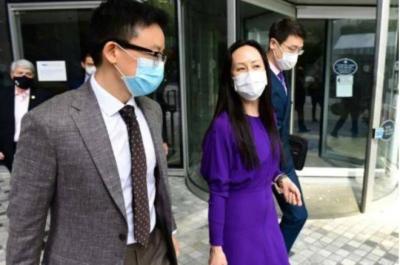Huawei's Chief Financial Officer Meng Wanzhou, who had been under house arrest in Canada for three years, flew to China on Friday after a Canadian judge ordered her release following a settlement between Washington and Huawei. Shortly afterwards, Canadian Prime Minister Justin Trudeau announced the release of Canadians Michael Spavor and Michael Kovrig, who had been detained in China since late 2018, confirming they were on their way back to Canada.
Meng, 49, boarded a flight to Shenzhen, as shown in television footage, shortly after her release under the settlement. A Canadian judge ordered her release on Friday, thus ending her extradition proceedings in a brief hearing at the Supreme Court in Vancouver. The hearing took place with Meng present, just hours after a settlement was reached between Washington and Huawei that allowed the CFO of the Chinese telecommunications giant, held in Canada for three years, to return to China.
Meng's case had exacerbated the divide between Beijing and Washington, with Canada caught in the legal dispute. Judge Heather Holmes stated after the hearing, "I have signed the release order." Following that, Meng held a brief press conference in which she thanked particularly the judge, her family, and friends. She stated, "Over the past three years, my life has turned upside down. It has been a worrying time as a mother and wife" and an employee of the company.
After the ruling, the Canadian Department of Justice confirmed that Meng was "free to leave Canada" and that she had benefited from "procedural justice before the courts, according to Canadian law." Earlier, U.S. authorities had agreed to the settlement reached between Washington and Meng. The settlement entails the suspension of legal proceedings against Meng, sparing her from the charges that had led to her detention for three years in Canada, which ultimately paved the way for her release.
U.S. Department of Justice attorney David Kessler stated during a session held in federal court in Brooklyn that the U.S. administration agreed to suspend the legal proceedings against Meng until December 1, 2022, provided she adheres to the terms of the agreement, after which the charges would be dropped. He also requested her "release on personal recognizance," without any financial bail, stating that the department would waive the request to extradite her to the United States for trial.
Canadian authorities had arrested Meng in Vancouver in December 2019 based on a U.S. warrant accusing her of defrauding HSBC bank and other banks by misrepresenting the connections between Huawei and its subsidiary company, Skycom, which sold communications equipment to Iran. According to the U.S. Department of Justice, Meng admitted under the terms of the agreement that she had made "false statements" at that time and that she "concealed the truth" from HSBC regarding "Huawei's activities in Iran," which is a country under U.S. and international sanctions.
Federal Judge Anne Donnelly in Brooklyn officially approved the agreement with Meng, describing it as "serious." If the agreement is not violated before December 1, 2022, the charges will be dropped, according to a representative of the U.S. Department of Justice.
The Wall Street Journal had previously reported that the agreement could allow Meng to return to China without facing any prison sentence in the United States. Canadian public broadcaster CBC, citing unnamed sources, reported that if the New York court proceeded with the agreement, Meng's house arrest could be lifted and her extradition case to the United States could be dropped. Meng is the daughter of Huawei founder Ren Zhengfei and was also a board member of Skycom.
On the release of the two Canadians, the U.S. finance system accused Meng of concealing financial dealings for the company, violating U.S. sanctions against Iran, and lying about it to FBI investigators. Washington, which has launched a campaign against Huawei for allegedly selling phones that allow the Chinese government to spy on Americans, pressured Canada to arrest Meng. Meng, who was facing a possible 30-year prison sentence, was placed under house arrest in Canada after her detention while the U.S. Department of Justice pressed for her extradition.
China, which described her case as "entirely political," detained two Canadian citizens—businessman Michael Spavor and former diplomat Michael Kovrig—on espionage charges days after Meng's arrest. Prime Minister Trudeau confirmed on Friday that Spavor and Kovrig were freed after being detained in China since late 2018 and that they were on their way back to Canada. This announcement came shortly after Meng's departure from Canada to China.
Trudeau stated at a press conference, "About 12 minutes ago, the plane carrying Michael Kovrig and Michael Spavor left Chinese airspace, and they are on their way to Canada." He added, "These men have endured a horrible ordeal for over a thousand days. They have shown resilience… and fortitude at every step; they are an inspiration to us all." He mentioned to reporters, "As this is an ongoing process, I cannot share details" regarding it.
U.S. Secretary of State Antony Blinken praised the Chinese authorities' decision to release the Canadians after their "arbitrary" detention. In August, a Chinese court sentenced Spavor to 11 years in prison, while no decision has been announced in Kovrig's case. Western nations have accused China of employing "hostage diplomacy" in the case of the two Canadians, which has brought Sino-Canadian relations to their lowest point. Trudeau had previously condemned the verdict against Spavor, labeling it "unacceptable and unfair" and deeming the charges against him as "fabricated."




